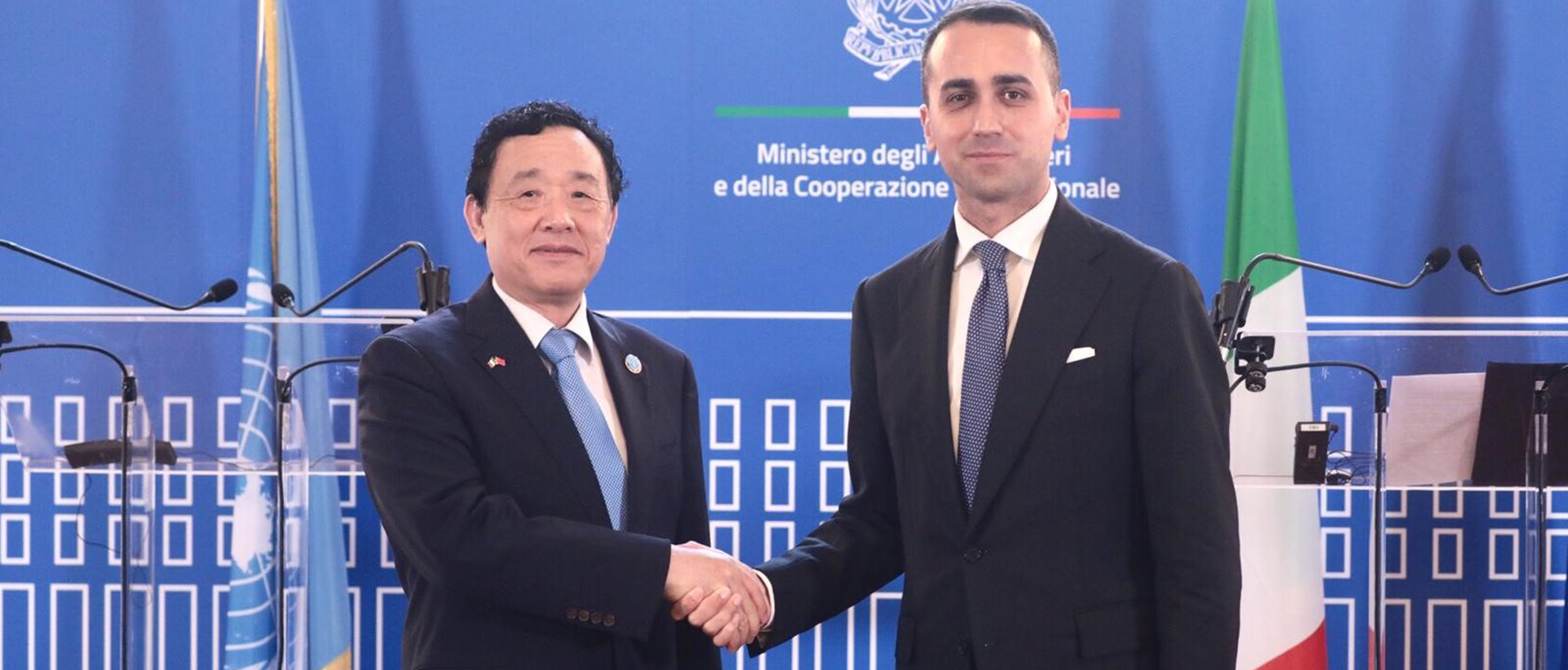Mediterranean Dialogue on Food Crisis: Conflict bolsters the case for transforming agrifood systems
FAO Director-General participates along with dozens of ministers in summit to tackle higher prices for food, fertilizer and fuel

FAO Director-General QU Dongyu, left, and Italian Foreign Affairs Minister Luigi Di Maio.
©FAO/Alessandra Benedetti
“We must keep our global food trade system open and ensure that agrifood exports are not restricted or taxed,” he said today at the Ministerial Mediterranean Dialogue on Food Crisis, an event convened by Italy’s Minister of Foreign Affairs, Luigi Di Maio, which drew ministers and government participants from more than 24 countries.
Qu outlined four major axis across which cooperative efforts should be made: (i) More investment in countries that are severely affected by the current increase in food prices; (ii) reduction of food loss and waste; (iii) better and more efficient use of natural resources, especially water and fertilizer; and (iv) a focus on technological and social innovations that can significantly reduce market failures in agriculture.
“Food insecurity and high prices can become a trigger for instability,” the Director-General warned. “It is high time to transform agrifood systems for people, peace and prosperity, by working together in partnership.”
All farmers, big and small, need to be enabled to apply risk management tools to handle their production and supply chain risks, while stronger social protection and targeted assistance is needed for those most affected by the crisis, he added.
Minister Luigi di Maio opened the Dialogue, noting that seldom has hunger had such a high profile on the public agenda and emphasizing the importance of sustainable agrifood systems.
“We are facing the worst food crisis in decades,” said Svenja Schulze, Germany’s Minister for Economic Cooperation and Development and co-chaired of today’s event.
Tomorrow’s harvests
High prices for fertilizers and fuels, both key agricultural inputs, are urgent matters for global food security, participants agreed.
“The increase in energy and fertilizer prices is putting at risk the next harvest globally,” Qu said. “The lack of access to key agricultural inputs represents a particular risks for countries where low natural soil fertility means that chemical fertilizer is often essential for food production.”
The Mediterranean Sea region includes 22 countries on three continents, each with diverse natural resources, agricultural traditions and production potential. While agricultural supports many livelihoods across the region, and some countries have strong agricultural sectors, many rely on cereal imports to feed their population, and most countries in the region had shown an increasing food import trend to meet domestic consumption needs even prior to the war in Ukraine, the Director-General said.
Ukraine was a major source of those imports, yet it is now logistically difficult to get the country’s farmers output to international markets. Finding alternative suppliers takes time and entails higher transportation costs, an extra burden as the FAO Food Price Index reached an all-time high in March of this year and remains at elevated levels.
Qu noted that FAO has proposed the Food Import Financing Facility to provide balance-of-payment support to the low-income countries most reliant on food imports. He urged FAO Members to support the plan and for International Finance Institutions to take ownership of it.
At the same time, sustainable solutions require concerted efforts to support the transformation of agrifood systems. The Director-General noted that policy makers today have a common language to articulate road maps going forward. “We must work together for better production, better nutrition, a better environment and a better life for all, leaving no one behind… Let’s do our best.”
Sustainably increasing agricultural productivity and production is critical, he noted. Reducing food loss and waste has large potential and is supported by a broad consensus. More efficient and effective utilization of water and fertilizer is also essential, particularly in the Mediterranean region, which has considerable opportunities to develop alternative inputs such as green ammonia, he said.
Qu congratulated the Government of Italy for its strong leadership in a difficult and challenging time. He participated in a brief press point with Minister Di Maio, who emphasized that food security remains a cornerstone of his country’s political agenda. Both he and FAO’s Director-General pointed to global support for that as evidenced by the signing last year, before the war in Ukraine broke out, of the Matera Declaration, at which G20 members pledged action in pursuit of zero hunger.
Contact
FAO News and Media (+39) 06 570 53625 [email protected]
Christopher Emsden FAO News and Media (Rome) (+39) 06 570 53291 [email protected]
